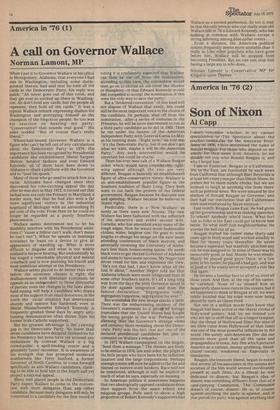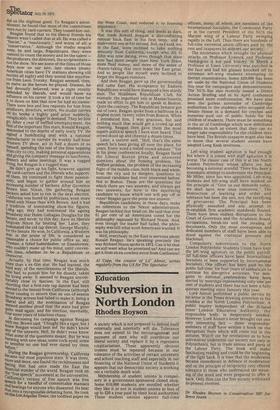America in '76 (2)
Son of Nixon
Al Capp I' clorOt., remember whether, in my various ,The 'Spectator about the po-SSIblEilVtiritlitlaWs(1fOr the American Presid*Witii 1941 Tri31Vr Mentioned the name Of
Rnhtild fliVrithOse who depend on me whnlly=eir news from America, let me cittitkIr tell you who Ronald Reagan is, and why I forgot him.
I an Easterner. Reagan is a Californian. We,'in the East, are fascinated by such news from California that although Burt Reynolds is at least ten years younger than Dinah Shore, he prefers her to more nubile. chicks, but we are inclined to laugh at anything else from there, such as political news. We were amused by the election of Ronald Reagan as Governor, and then had our conviction that all Californians were mad reinforced by his re-election.
Last month, Reagan came East. He had given up the governorship and was making speeches. To whom? Anybody who'd listen. What for? Just so folks in the East could get to know him better. To what end? Just neighbourliness. He worries the hell out of us.
Reagan started his career some thirty-odd years ago in Hollywood and worked steadily in fihns for twenty years thereafter. He never became a superstar, but manfully attacked any role he was assigned to: In none of these was he memorably good, or bad. Mostly he was steady. Mostly he played good guys. Once, in a low point in his career, he played a bad guy, and was so good at it he wisely never accepted a role like that again.
He became a familiar face to all of us, over all those years. And then, at the top of his career, he vanished. None of us missed him so desperately there were riots in the streets, but if we happened to think of Reagan at all, we were mildly puzzled that his roles were now being played by such as Glenn Ford.
Not one in a million movie fans knew that Reagan had been active in the liberal circles of Hollywood politics. And, let me remind you who are apt to sniff that 'off as a teapot tempest, that the thrust of Hollywood films (for nine of ten films came from Hollywood at that time) was one of the most powerful influences in the world. One subtly anti-American film did our enemies more good than all the spies and propagandists in town. Any film which pictured America as a callous, money-grubbing, bloodcrazed society, weakened us. Especially in translation.
Reagan, the innocent liberal, began to notice that several of his associates in the unions and societies of the film world seemed inordinately pleased at such films. As a liberal he was dedicated to dissent, but Reagan's idea of dissent was something different from that of a card-carrying Communist. The Communist doesn't of course, dissent. He is, of course, against anything the party is. against, and in that period the party was against anything that did us the slightest good. To Reagan's astonishment, he found that most of the committees were run by card-carriers. They tossed him out. Reagan found that to his liberal friends his dissent wasn't called that at all. He was called a "fascist," a "reactionary," and worst of all, a "Conservative." Although the studio moguls were, by and large, Republicans, they were content to count the money and let the talent — the producers, the directors, the scriptwriters — run the show. We see some of the films of those days now on our late, late shows (many American cities have TV stations showing old movies all night) and they sound like manifestos from Leon Trotsky. Reagan seemed, then, as naive as the heroes he played. Dissent, he had devoutly believed, was a right stoutly defended by liberals, and would have no influence on his career. It took a bit of time for It to dawn on him that now he had no career. There were less and less requests for him from Producers, directors, writers. No studio carries on its books a highly paid actor suddenly, inexplicably, no longer in demand. They let him O. After a year of baffled unemployment, the first of the important film stars, Ronald Reagan, descended to the depths of early lowly TV. He signed a humiliating deal with a national Manufacturer to narrate its weekly half-hour Western TV show, act in half a dozen or so himself, spending the rest of the time hopping from city to city, making personal appearances and giving the company message to luncheons, dinners and sales meetings. It was a rugged living, but Reagan is a rugged man.
He didn't give up his fight, however, against the card-carriers and the liberals who supported them. He continued to fight them passionately, and began to gather around him an increasing number of backers. After Governor Brown beat Nixon, the gathering Reagan backers asked him to run in the next election. California was bored by politicians, even more bored with Nixon than with Brown. And it had a tradition of nominating show-biz figures. Long ago, they had nominated the ageing 13roadway star Helen Gahagan Douglas for the Senate, and never, to this day, have its liberals forgiven Nixon for beating her. Later, they nominated the old tap dancer, George Murphy, for the Senate. He won, In California, a Western star, in the prime of life, is considered as reasonable a choice for public office as, say, Truman, a failed haberdasher, or Eisenhower, Who couldn't make up his mind, until convention time, whether to be a Republican or Democrat.
Actually, by that time, Reagan was much more than a ex-film star. He had learned, the bard way, of the mercilessness of the liberals, Who had, to punish him for his dissent, taken his living away. It seemed to Reagan uncomfortably close to fascism. In the East, still Chortling that a first-rate tap dancer had been elected to the Senate from California (although never ceasing to mourn that an out-of-season Broadway actress had failed to make it, being a liberal and all), the nomination of Reagan seemed another Proof that the state had gone quite mad again, and his election, inevitably, four more years of hilarious chaos. In discussing his campaign against Reagan ,Ivith me, Brown said, "I fought like a tiger, but I itnew Reagan would beat md. He didn't know any of the answers. Hell, he didn't even know Y'hat some of the questions meant. But he was oursting with new ideas, some cock-eyed, some S o sensible no one had ever dared try them before."
During the Reagan governorship, California became our most populous state. It was there, Inore and more, one found the recklessness and 12.aring that had once made the East the nancial wonder of the world. Reagan took on Ljle "free speech" movement at the universities. alifornia's version of free speech was free Veech for a handful of committable maniacs aId beatings for anyone who dissented. He beat that into a recognisable debating form. He took on the Los Angeles Times, the lordliest paper on
the West Coast, and reduced it to foaming impotence.
It was this sort of thing, and deeds as dark, that made Ronald Reagan a discomforting rumour back East in his first term, and a malevolent one in his second. But, as I said, we, in the East, were inclined to take nothing seriously from California, except who Jill St John was now dating, even though that state now had more people than New York State, more fluid money, and more of the sense of chance-taking that once made the East great. And so people like myself were inclined to forget the Reagan rumours.
And then Reagan gave up the governorship and came East. His acceptance by Eastern Republicans would have dismayed a less sturdy man. The Middlesex Republican Club, for example, the important one in Massachusetts, made no effort to get him to speak in Boston. Quite the contrary. The Republican Senator got out of town. Reagan spoke from a ballroom in a modest motel, twenty miles from Boston. When I introduced him, I was gracious, but said nothing much that would get a crowd up and cheering. Reagan then gave them the most superb political speech I have ever heard. That crowd stood up and cheered a dozen times.
Later, a sneerer said, "Hell, that's the same speech he's been giving all over the place, for years. Every word a tested crowd-pleaser." Yet in his press conferences locally, Reagan faced the Liberal Boston press and answered questions about the bussing problem, the welfare problem, the problem of the increasing flight of the middle-class, both black and white, from the city and its dangers; questions no national candidate had ever answered before. Not in Boston. These are the questions for which there are two answers, and always get two answers, for how is the squirming candidate to know which one will pay off in votes? Reagan gave the press one answer.
Republican candidates, in these days, make no references to the Nixon administration. Reagan tackled that head-on. He said that over 61 per cent of all Americans voted for the philosophy espoused by Richard Nixon. And, even though the leader had failed, the philosophy was still what most Americans wanted. It was his philosophy.
Well, everybody in the East is nervous about Ronald Reagan. He's speaking precisely the way Richard Nixon spoke in 1972. Can it be that we still want what he promised us? And can we get it from an ex-cowboy actor from California?
Al Capp, the creator of Lil' Abner, writes regularly from the US for The Spectator



































 Previous page
Previous page